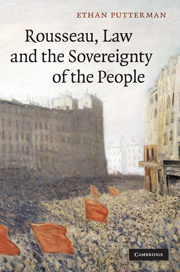Book contents
- Frontmatter
- Contents
- Acknowledgments
- A note on the text
- List of abbreviations
- Introduction: The celestial voice
- 1 Rousseau's concept of law
- 2 Agenda-setting and majority rule
- 3 Democracy and vote rigging
- 4 Popular sovereignty and the republican fear of large assemblies
- 5 Enforcing the laws in Poland and Corsica
- 6 Judging the laws/when legislation fails
- Conclusion: Law and liberty
- Select bibliography
- Name index
- Subject index
6 - Judging the laws/when legislation fails
Published online by Cambridge University Press: 04 August 2010
- Frontmatter
- Contents
- Acknowledgments
- A note on the text
- List of abbreviations
- Introduction: The celestial voice
- 1 Rousseau's concept of law
- 2 Agenda-setting and majority rule
- 3 Democracy and vote rigging
- 4 Popular sovereignty and the republican fear of large assemblies
- 5 Enforcing the laws in Poland and Corsica
- 6 Judging the laws/when legislation fails
- Conclusion: Law and liberty
- Select bibliography
- Name index
- Subject index
Summary
Of all of the stages of lawmaking in the Social Contract that of judging or adjudicating the laws is undoubtedly the least familiar. It is not only that Rousseau says very little about how the laws are to be adjudicated in his just state but that very few of his readers examine this subject at any length in their voluminous treatments of his politics. This is true not only for the Genevan's most distinguished commentators writing at the beginning of the twentieth century but for more recent scholars as well. Explorations of the topic are extremely brief and superficial at best. Arthur M. Melzer, for example, writes only that “Rousseau does not establish a clear distinction or separation between the judicial and executive powers.” Similarly, decades earlier C.E. Vaughan remarks how in judging the laws “large discretion [is] in the hands of the Executive,” a body “less liable to be blinded by ignorance – than the body of citizens, as a whole.” A few years later, Alfred Cobban comments that “Rousseau distinguishes and separates the executive, legislative and judicial functions clearly enough. He takes for granted the division of the magistrature between those exercising executive and judicial functions, indicating that the judicial function is to be separated from the legislative because it is concerned with particular acts.” Based upon his observations of Geneva, Rousseau assumes, according to Cobban, “there is to be a separate class of judges, though preferring the classical idea of choosing these for their general merit from the whole body of citizens, rather than the modern practice of recruiting them exclusively among the class of legal experts.”
- Type
- Chapter
- Information
- Rousseau, Law and the Sovereignty of the People , pp. 146 - 172Publisher: Cambridge University PressPrint publication year: 2010

